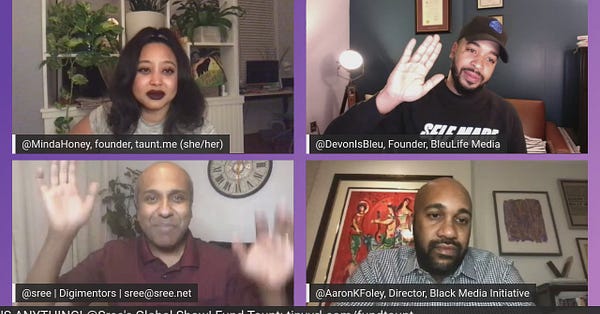What happens if Facebook is broken up?
It's tough to say, but we may see a trimming of the tech giants
Sree’s newsletter is produced w/ Zach Peterson (@zachprague). The tweet by Mark Gongloff (@markgongloff) captures how America has failed in handling the pandemic. Nick Kristof (@nickkristof) has an excellent roundup on who’s to blame (clue: it’s Trump - and more).
Scroll down for Read Something; Watch Something; a weekly tech tip from Robert S. Anthony (@newyorkbob), and much more.
TUNE IN: Sunday #NYTReadalong w/ Nancy Newhouse, former Travel Editor and Living / Style Editor for The New York Times (8:30 am ET - watch live or later). She is also the editor of "Hers: Through Women's Eyes," a collection of sixty-five of the most memorable essays to appear in the NYT “Hers” column.
After 250 episodes in 250 days, my global show has moved from daily episodes to 1-2 times a week. Next: Tuesday 9 pm ET, we examine what’s driving the farmers’ protests in India. The best way to know when I’m on the air and see all my archived shows, is to subscribe to my YouTube channel or my Whatsapp alerts.
My Digimentors team is working with companies and nonprofits around the world to create virtual and hybrid events. We’ve worked on events for 50 people and 100,000 people. See our new brochure. Don’t cancel or postpone your conference - contact us! sree@sree.net
***
In case you’ve been consumed with the blatant attempt to dismantle American democracy, nearly every state, and the Federal Trade Commission (FTC), separately sued Facebook for “illegally maintaining its personal social networking monopoly through a years-long course of anticompetitive conduct.”
For lawyerly-types, here’s the FTC suit. For PR-types, here’s Facebook’s response.
This is no frivolous lawsuit, and it’s not coming out of left field.
It’s easy to say, “Break up Facebook.” But unwinding Instagram and WhatsApp from Facebook would be an arduous, appeal-ridden feat that would likely take years. That it would take a while to actually do doesn’t really bother me, and I don’t see how anyone would really care that breaking the company would be “hard.” Of course it would be hard.
Facebook will spare no expense on the legal fight — be sure of that. According to the Center for Responsive Politics, Facebook spent about $350,000 on lobbying efforts in 2010. In 2019, the company spent $16.7 million and, through Q3 2020, is on pace to end this year with another record expenditure. This process will be long, expensive, and will require a bit of political backbone from government officials.
My issue is that I don’t see how carving out Instagram and WhatsApp would actually fix any of Facebook’s issues. There is so much to hold Facebook accountable for — rampant and persistent misinformation, hate speech, hate groups, the way they've handled the Trump presidency, not having enough local staff to cover Myanmar and Sri Lanka that resulted in so many deaths… the list truly does go on and on. I can’t help but think that the calls to break up the company are a manifestation of the desire of some to punish the company for transgressions that have little to do with its purchases of Instagram and WhatsApp.
On the other hand, it’s inarguable that Facebook and Google operate a duopoly in the digital advertising space — together they take in more than 60% of all digital ad spend dollars, and that’s only increasing. Instagram accounts for nearly a quarter of Facebook’s ad revenue (and earned more than YouTube in 2019), so they have every reason to want to hang on to it for as long as possible. On the innovation side, we don’t know about the things we never got a chance to try.
Kara Swisher (@karaswisher) and Scott Galloway (@profgalloway) discussed the lawsuits on the Pivot podcast this week (starts around the 12-minute mark), and they both make a lot of good points about the last decade of Facebook’s rise. If Facebook doesn’t buy WhatsApp, perhaps WhatsApp becomes something wholly different, finding a viable business model in workplace collaboration. In the case of Instagram, sure it’s benefitted mightily from its integration into Facebook’s robust ad network, but the company was well-funded before Facebook scooped it up, and there’s no reason to think it’s wouldn’t be an incredibly valuable company on its own.
Facebook isn’t alone. Google has its own legal fight with the Department of Justice over monopolistic practices in search, Amazon is under investigation in the EU over monopolistic practices in its marketplace, and one can’t help but feel like there’s a lot of momentum towards a fundamental rethink of what “big tech” means.
As things stand now, I would say I’m relatively neutral-ish on this whole thing. Even broken up, Facebook would still be a massive company on its own, and continue to command an extremely strong position in the digital ad space. My issues with company lie more on the moral side than the business side, and I’m not sure breaking off subsidiaries will do much to address them.
- Sree
Read Something
We’ve used this space to talk about disinformation more often than I would hope, and here we are again — this time it’s a broad stroke from Jane Lytvynenko that really drives home just how extensive the damage is.


Tech Tips from @NewYorkBob: Will Startups be Stuck at the Gate in 2021?
By Robert S. Anthony
Each week, veteran tech journalist Robert S. Anthony shares a tech tip you don’t want to miss. Follow him on @newyorkbob.
The best (and most tiring) thing about reporting on gizmos and gadgets is that one can never catch up. As soon as the cyber ink dries on a gadget review, someone somewhere is announcing something better.
Even during cruel pandemic times, the tech industry forges ahead. Or does it? Yes, big, established corporations like Samsung and Apple can always get the word out on their new products and technologies, but what about small companies and startups? For them, I’m worried.
For years, a good way to sample the innovation trends in the tech industry has been to venture into noisy, cramped and congested Eureka Park, the section of CES (formerly called the Consumer Electronics Show) filled with startups from around the world. Some of the interesting Eureka Park exhibitors from CES 2020 in January included:
WOWCube by CubiOs Inc.: The unit resembles a Rubik’s Cube, but instead of colored squares has 24 microdisplays that react to tilts and twists and can be programmed with games and educational tasks. Starting with a concept by inventor Savva Osipov in 2016, WOWCube is now close to final production, according to its website.
Wonder Painter: A technology that uses artificial intelligence to transform simple drawings and photos into animated characters which can be inserted into games or other software. Using a simple app, users can turn themselves into cartoon characters.
In January more than 1,200 startups competed for the attention of more than 2,000 venture capitalists and 6,300 members of the media at Eureka Park, according to CES. But with only a virtual CES for 2021, these startups won’t get this opportunity to acquire the funding and publicity needed to get to the next level—a Zoom can only do so much.
So, when will startups get to meet and greet in person again? Only time will tell. Unfortunately, like restaurants and other small businesses, time tends to run out quickly for startups.
Thread to Follow
Facebook and Twitter are the platforms most-discussed when we discuss political polarization and the digital world — but it’s almost always YouTube that ends up being the central place for hate to find an audience.


Watch Something
Representation matters, and few institutions are more important than the press. So many crucial issues are under-reported simply because the communities most affected are not represented in the newsroom. The Black Media Initiative is trying to fix that in many ways. We discussed their new Black media map and directory this week.


Watch Something…else
On Monday at 9:30 am EST, there will be a total solar eclipse visible from the Patagonia region of South America. My friend Carl Shephard, Founder and CEO of Insider Expeditions, passed along a note with a link to watch the eclipse (below), and an invitation to a discussion with award-winning author, journalist, and eclipse-chaser David Baron, on Sunday at 6pm PST.
Odds & Ends
🗞 Sunday #NYTReadalong w/ Nancy Newhouse, former Travel Editor and Living / Style Editor for The New York Times
The Readalong is followed, on Sundays at 11 am-noon ET, by a new medical show I’m co-executive producing with surgeons Sujana Chandrasekhar, M.D. (@DrSujanaENT), and Marina Kurian, M.D. (@MarinaKurian), called She’s On Call (watch live or later).
After 250 episodes in 250 days, my global show has moved from daily episodes to 1-2 times a week. Next: Tuesday 9 pm ET, we examine what’s driving the farmers’ protests in India. The best way to know when I’m on the air and see all my archived shows, is to subscribe to my YouTube channel or my Whatsapp alerts.
The Sunday #NYTReadalong is sponsored by Muck Rack and Strategy Focused Group. Interested in sponsorship opportunities? Email sree@digimentors.group and neil@digimentors.group.
🎧 Every Saturday, I host a call-in show on WBAI 99.5FM (@wbai) - "Coping with Covid19" - focused on being helpful, hopeful, and focusing on the pandemic's effects on society’s most vulnerable. Listen live Saturdays from 12-2pm EST, or later. And, of course, call in or tweet questions for us using the #wbaisree hashtag! Listen to this week’s episode here!
👀 Did we miss anything? Make a mistake? Do you have an idea for anything we’re up to? Let us know! Let’s collaborate!




